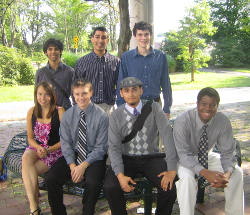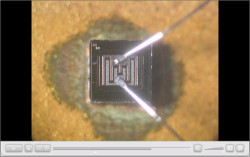- Home
- Research
- Education & Outreach
- Facilities
- Industry
Education & Outreach
 The education and training of the next generation of scientists and engineers is a vital activity in the Center. The CHM strives to provide high-quality training geared towards innovation and an enhanced base of nanomanufacturing capabilities, as well as educational materials and opportunities designed to excite and instruct K12 students, undergraduates and the public. Core strategic principles underlying the CHM Education program are:
The education and training of the next generation of scientists and engineers is a vital activity in the Center. The CHM strives to provide high-quality training geared towards innovation and an enhanced base of nanomanufacturing capabilities, as well as educational materials and opportunities designed to excite and instruct K12 students, undergraduates and the public. Core strategic principles underlying the CHM Education program are:
- Repurposeable Learning Modules—the CHM’s primary curricular contribution to science education is through a planned system of relatively short, video-based, multimedia-enhanced learning modules created using Universal Design for Learning principles, enabling re-configuration and re-use for different audience types.
- Teamwork—a Nanotechnology Education Development Group successfully functions as a curriculum development team for module creation, led by the Co-Director.
- Train the Trainer—the CHM’s educational program focuses on one-week teacher workshops for learning curriculum modules and trying out nanoscience-related experiments, as well as a summer-long Research Experiences for Teachers program, rather than on direct K12 outreach to thousands of individual students.
- Networking and Dissemination—we work toward integrating and disseminating our materials and activities through important NSF-sponsored networks and consortia for nanotechnology education, through professional organizations and other networks in science education, and within the technical community college and industrial education communities.
 The Center supports the development and dissemination of a system of curriculum modules on nanotechnology and nano-related science for grades 7-12 and community college learners. The Center also trains teachers in teaching this curriculum in the classroom. At the university level, the Center supports new undergraduate courses at UMass Amherst in nanotechnology and nanomanufacturing, and encourages faculty to infuse their existing undergraduate and graduate courses with new material based on the Center’s research. In combination with the CHM’s efforts in Diversity, the Center is involved in a 7-participant REU program, the Summer Undergraduate Research Experiences (SURE) Program in Nanotechnology.
The Center supports the development and dissemination of a system of curriculum modules on nanotechnology and nano-related science for grades 7-12 and community college learners. The Center also trains teachers in teaching this curriculum in the classroom. At the university level, the Center supports new undergraduate courses at UMass Amherst in nanotechnology and nanomanufacturing, and encourages faculty to infuse their existing undergraduate and graduate courses with new material based on the Center’s research. In combination with the CHM’s efforts in Diversity, the Center is involved in a 7-participant REU program, the Summer Undergraduate Research Experiences (SURE) Program in Nanotechnology.
Highlights:
- On October 26, 2013, the CHM held its 4th annual Science Quest for high school students. The program brings underrepresented students to the University of Massachusetts Amherst to participate in mini-courses and demonstrations, presentations, and guided tours of science and engineering labs. CHM faculty members developed and delivered 18 original 50-minute sessions throughout the day. The 2013 event was attended by 266 students, of which 47% were underrepresented minority students and 59% women.
-
The CHM co-sponsors SciTech Café—a monthly informal science outreach event that reaches a public of all ages, with an attendance of more 100 people per event. The Café has presented a variety of topics, including talks on nanoscience, imaging techniques, renewable energy, solar energy, fuel cells and more.
-
The CHM expanded its comprehensive set of curriculum materials for K-12, community college and university science education. These include new video modules, hands-on activities, and courses at the community college and university levels, including modules on self-assembly, magnetism at the macro- and nano-scales, as well as training modules for the nanofabrication shared user facility at the University of Massachusetts Amherst.
-
The CHM hosted its seventh annual week-long Summer Institute in Nanoscience for K-12 science teachers. The 2013 Institute trained 27 science teachers on 10 nanotechnology modules with hands-on activities for K-12 classrooms. Curriculum from this highly popular workshop has been widely disseminated through years of this workshop and a short-course version at the annual National Science Teachers Association (NSTA) conference.
-
The CHM ran its eighth successful REU program during the summer of 2013. The ten-week Summer Undergraduate Research Experience (SURE) Program in Nanotechnology has now served 70 participants, of whom 45% are underrepresented minorities and 44% female. The SURE Program introduces students to high-level mentored research encompassing a range of nanoscale science and engineering projects.













